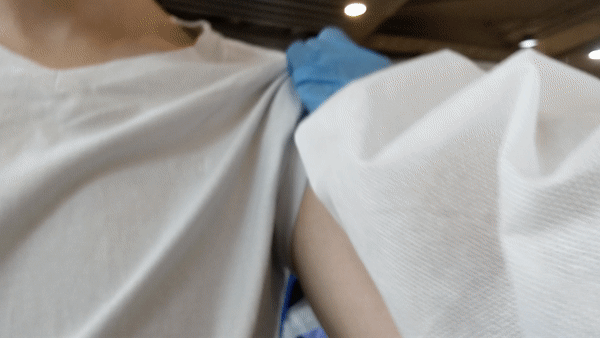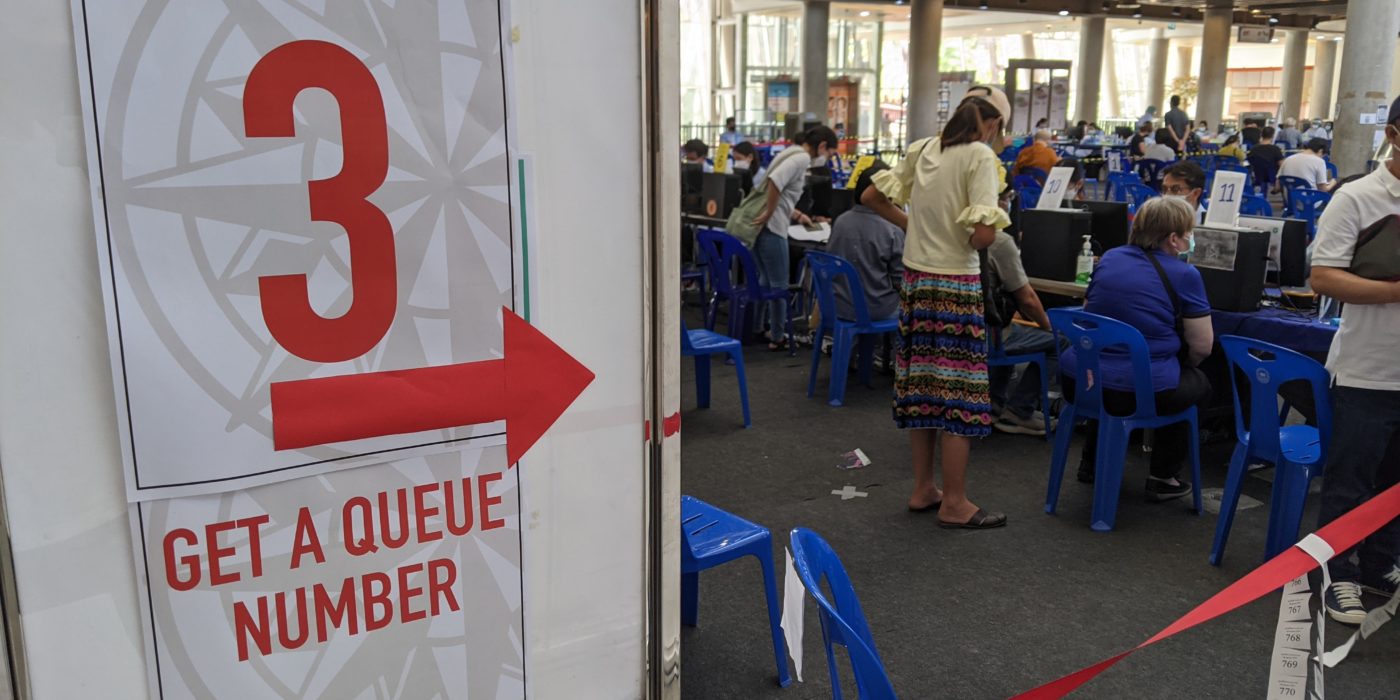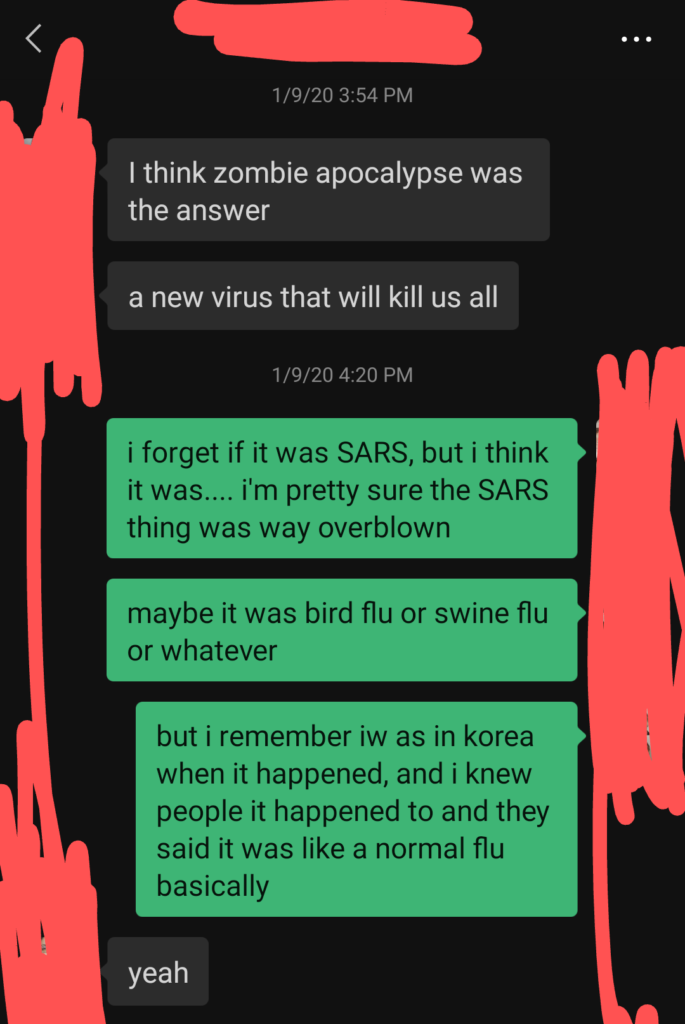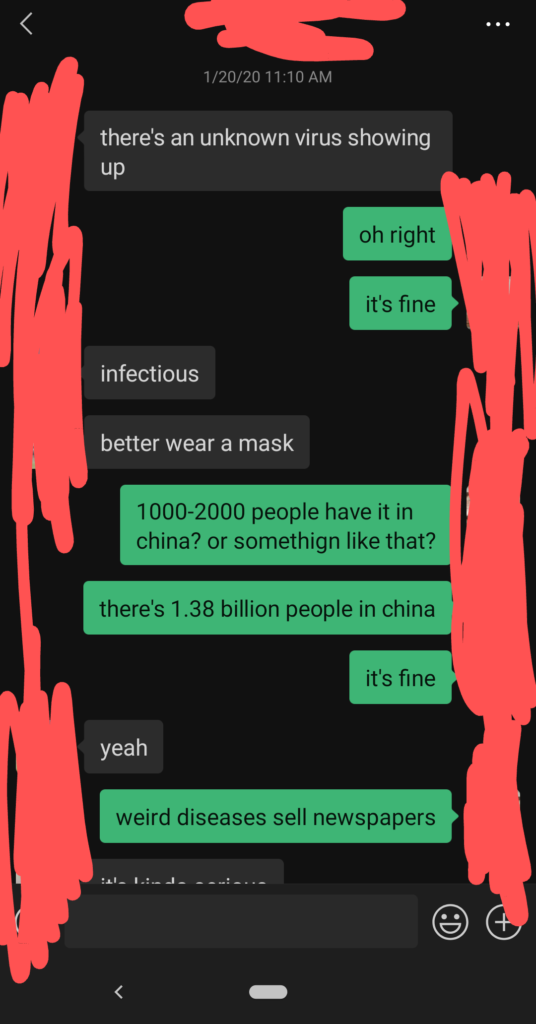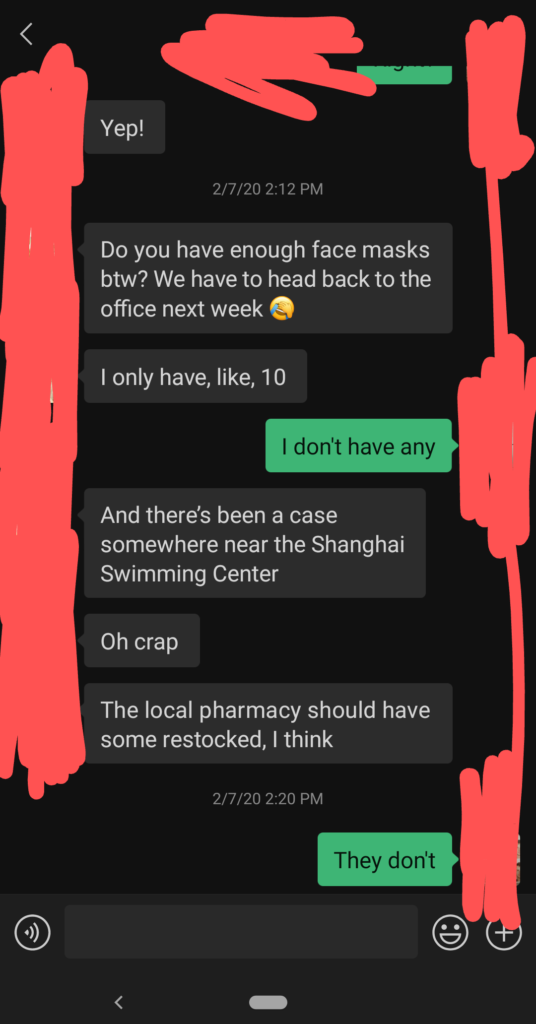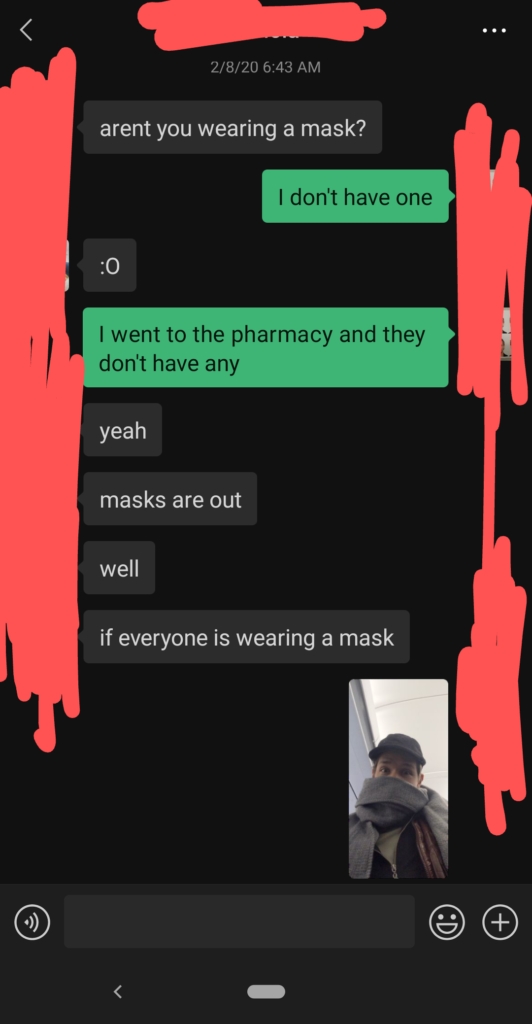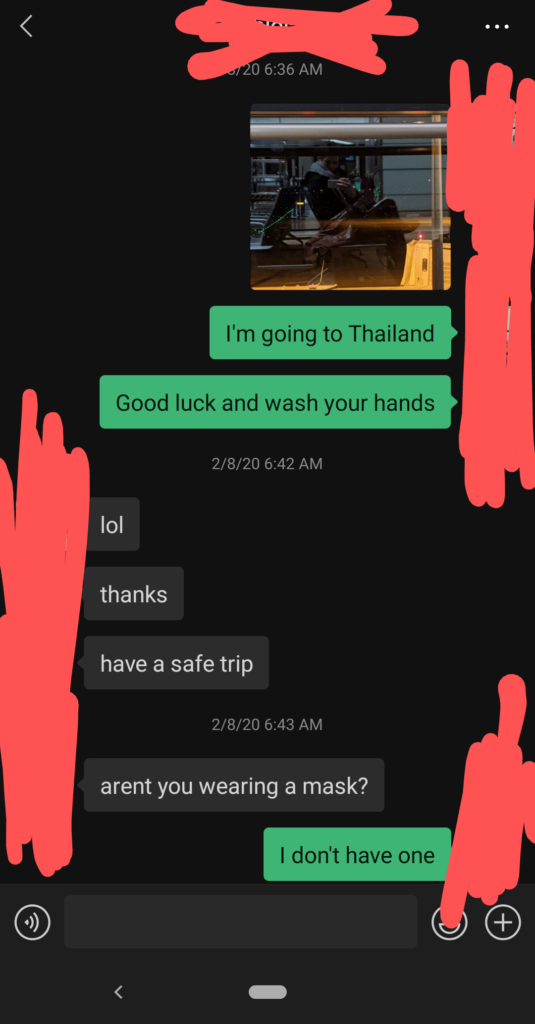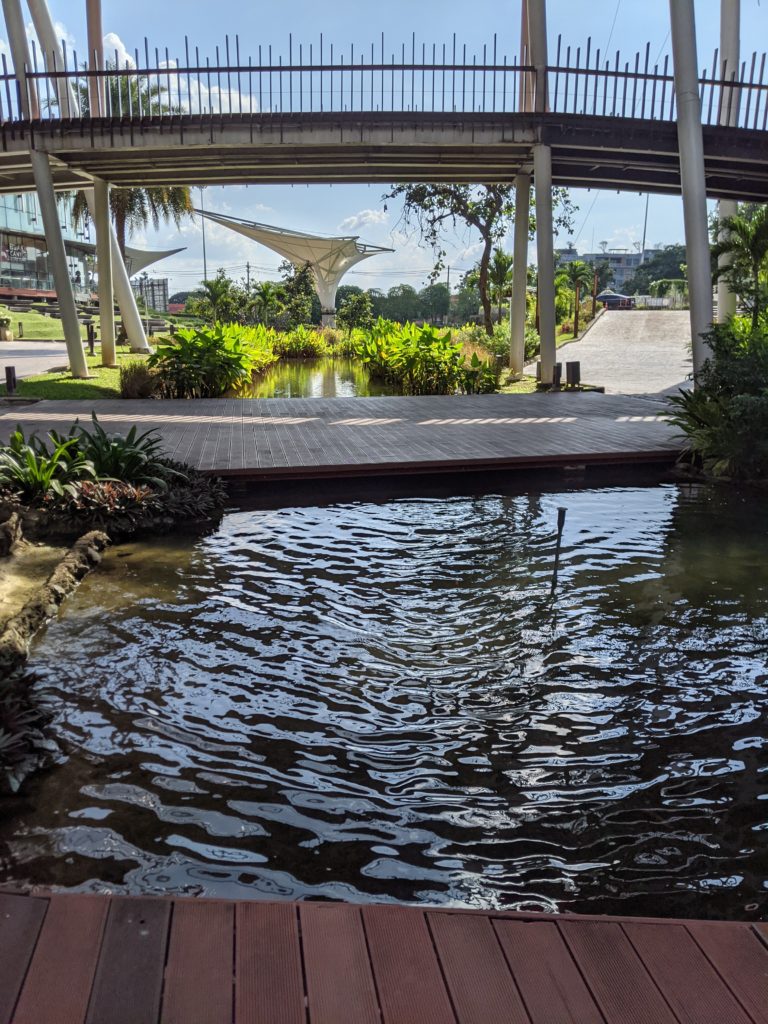
You get your first Pfizer vaccination shot at the Promenada Mall in Chiang Mai, Thailand. That’s the mall on the southeast side of town that’s always empty despite it’s beautiful outdoor bridges crossing over the schools of fish in the blubby blubby bayou.
They’ve cleared out the ground floor of the second building. That’s the one with the cinema and the restaurants. .
Last time you were here, this floor was filled with vendors selling kids’ toys and educational books. Now it’s full of bright blue plastic chairs spread across the floor so that people can sit for thirty minutes after receiving their vaccination and make sure they don’t have an adverse reaction. The chairs are all six feet apart. Social distancing.
The entire floor of the mall has been converted to a nursing station. Large signs with numbers guide people through the order of each station. Paper work. Temperature check. Oxygen level check. And so on.
Text on the signs is in English. This is a vaccination drive specifically for foreigners in Thailand. There hasn’t been much tourism in Thailand over the past year, but there’s still quite a few of us stuck here, by choice or otherwise.
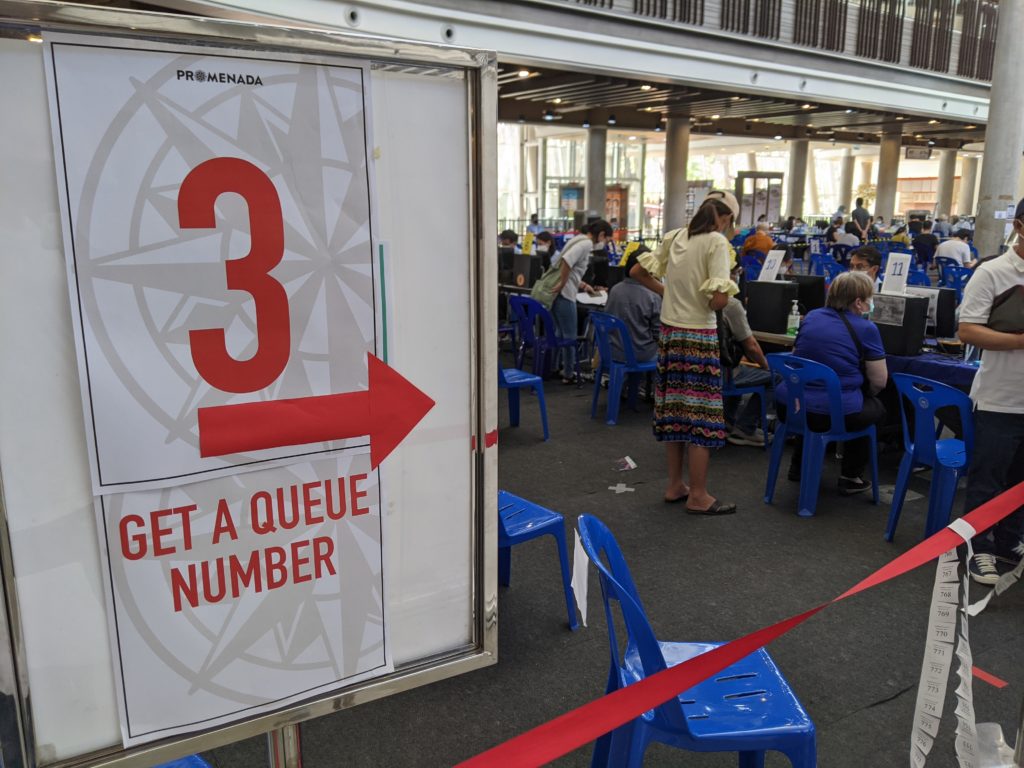
You signed up for vaccination months ago through a website that assured you it would send a notification when a vaccination spot opened up. Notification never came. Instead, you saw news about foreigner vaccination drives from the Chiang Mai News in English group on Facebook.
The first one you saw was for foreigners aged 60+. Over time, the new vaccination drives dropped in age from 60 to 55 to 50 to 40. Then you really started paying attention. You’re nearing 40, despite your face, personality, mentality, state in life, and everything else.
You checked the page so often that the Facebook algorithm placed it at the top of your news feed. You started getting notifications for new posts. Is there a word yet for technology that is both creepy and convenient?
You saw within minutes when news came for the 30+ year old foreigner vaccination drive. You signed up on the Eventbrite site and got your ticket.
And now, here you are. It’s October 18, 2021. Almost two years after it all began.
Back then, the President of your country got into controversy by speaking to the United Nations and calling it the China Virus.
You were in China at the time. You have screenshots of chat conversations in which you talked to a coworker about a new virus that popped up in a city called Wuhan. It was the first time you had heard of Wuhan.
Wuhan is a city with over ten million people. That’s two million more than New York City, yet Wuhan is only the eighth most populous city for China.
You were in Shanghai, which is China’s most populous city. It has twenty six million people.
On January 9 of 2020, a coworker sent you a link about a new virus found in Wuhan, China.
On January 20 of 2020, another coworker told you to be careful and wear a mask because of the new virus going around. You told her that it probably wasn’t a big deal and that it would pass over like all the other virus scares.
By January 29, 2020, cities in China began closing down. You tried to buy a mask at four different pharmacies, but they were sold out.
On February 8 of 2020, you had convinced your boss to let your department work remotely and you flew to Thailand. You told people you’d stay there until this virus ran its course, which you predicted would take a few weeks. Maybe two months, tops.
On March 2 of 2020, you took a one day trip back to Shanghai to bring the rest of your junk to Thailand. At the time, life in Thailand was proceeding as normal, except a few more masks on the street than average. In Shanghai, your apartment complex required a sign in and temperature check to enter. Delivery drivers had to leave food at the security gate. Buildings that were open required a green light from a health status app on the phone. You didn’t have the app, so you couldn’t have one last meal at your favorite Shanghai restaurant.
With your junk in a bag, you walked out of your apartment and placed the key high up on a gas gauge. You took a picture of it so you could send it to your landlord after you returned to Thailand. He still had your safety deposit, and you would tell him that he could keep it.
Two weeks later, China closed its borders.
Then on March 22 of 2020, news broke of a virus super spreader event in Thailand. Thailand began to lock down.
And that was all fine. But by the end of the month, it was also spreading through the United States. It seemed to start from the coasts and then began creeping inwards. Creeping towards your parents in the middle of the map.
On March 27 of 2020, you saw a photo Mom posted on Facebook. It showed her in a large line at Costco, with a comment about trying to buy cheese. You sent a long email to Mom and Dad about cautionary data on the virus and your desire for them to be safe but also your understanding that they need to live life their way.
To your immense relief, they told you that they agreed. They told you they planned to be more cautious from now on.
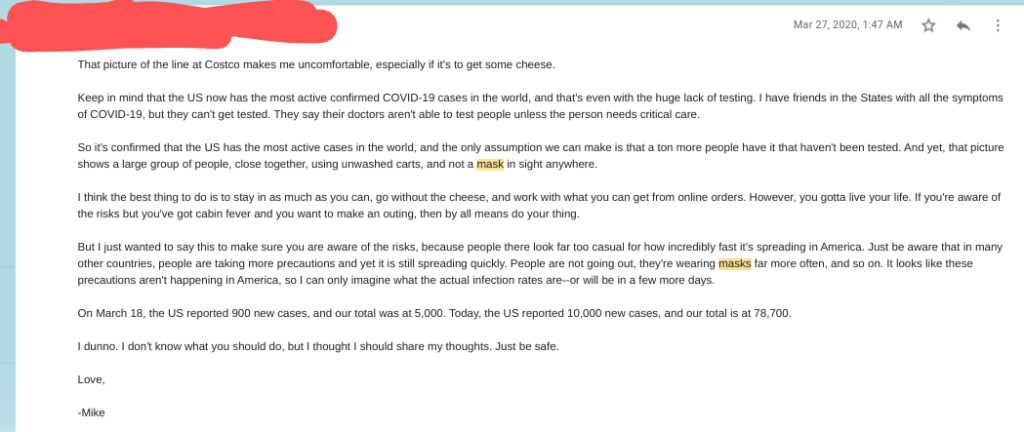
Through Skype calls, you talked with them about your options. Going back to China, staying in Thailand, coming back to the US. At that time, returning home would require quarantine at a designated military base. You and Dad thought that might be a cool story. Mom wasn’t so sure.
Either way, you know that you could have returned home. But you didn’t.
What you didn’t tell them, or anyone, is that your daily nightmare was the thought of them in a hospital’s isolation room struggling to breath with a ventilator shoved down their throat while you’re on the other side of the world playing make believe with your fake career as a writer.
Still, you could have returned home. But you didn’t.
They’re both vaccinated now, and that news was more of a relief than your own vaccination. You rolled the dice and it came out your way. What did you do with the time? I hope it was enough to be worth it.
A year and a half after it began, you’re still in Thailand and now you’re getting a vaccination for this virus. The name of the virus is SARS-CoV-2. It causes a disease called Covid-19. And that president isn’t the president anymore.
Covid-19 is not extremely deadly, but it is extremely contagious and a person can have it for weeks without knowing they have it. That’s what the scientists say, anyhow. Not like you know anything about it. You weren’t sure what the difference between a virus and a bacteria was a year ago.
It turns out that low mortality and highly contagious is the way to go, if you happen to be a virus with ambition.
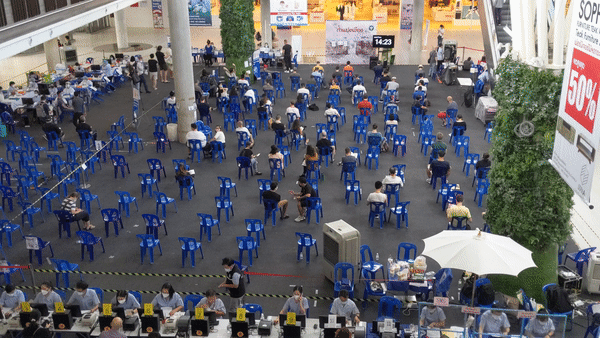
For your vaccination, you came with all the paperwork ready. When you filled it out, you had to look up that old email where you told your parents your address in Thailand. You can never remember little details like that.
After you filled out the paperwork, you kept it in pristine condition, hidden safely in a hard case in your apartment.
You keep nothing pristine in your apartment. The laces on your shoes are frayed. The arms on your computer chair are splayed. Your socks have holes in them. Your desk is littered with empty bottles of green tea and whiskey.
But you kept those papers pristine.
These papers end a stressful chapter of your life. Or if it doesn’t end the chapter, it at least turns the page.
You arrive on October 18, 2021 with your pristine papers in hand. And then you stand in line.
The line is long. It bends across the central plaza of the mall and around by the clothing outlet, curving when it reaches the escalator.
It’s also a quiet line. It is filled with people from many different countries. All with masks up and eyes wide. Waiting with the patient anxiety of being a few steps away from hope.
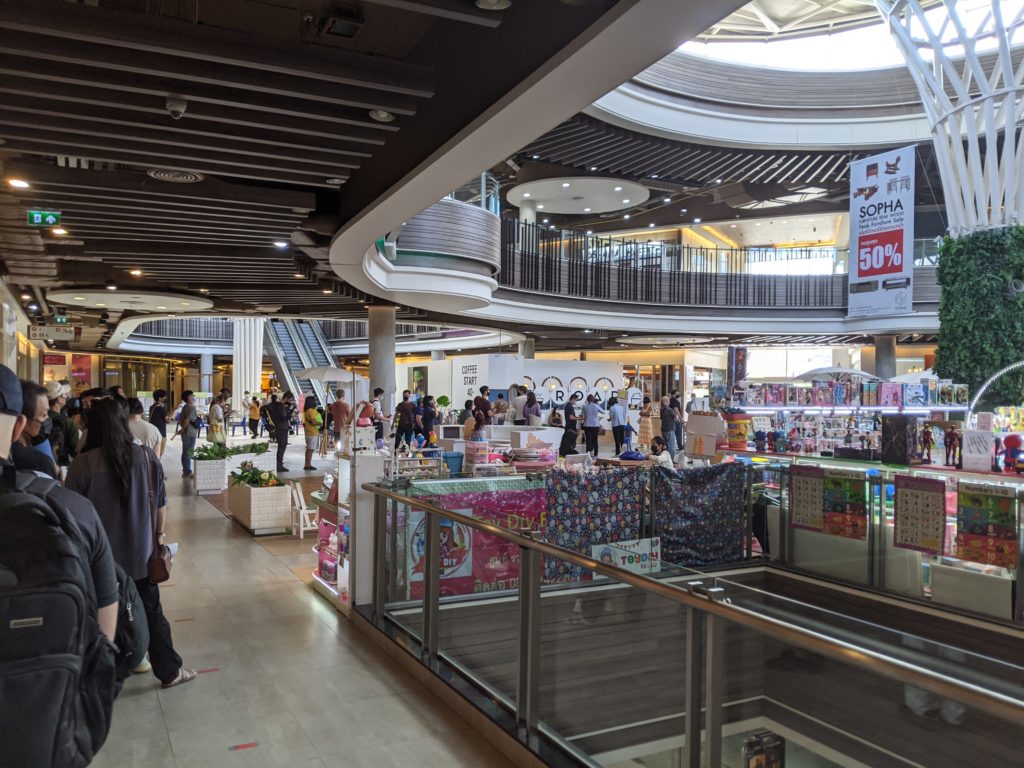
Looking around, you wonder what each of them has been through in the past year and a half. What story is each of them holding?
Maybe that one was a digital nomad hopping from one location to the next when Covid restrictions forced them to end the transience.
Maybe that one was in a long distance relationship with someone in Thailand, and just before the borders closed they made the impulsive decision to move here and see if they could ride it out. They couldn’t ride it out. Now they’re alone and stuck here.
Maybe this one argued and fact-checked every anti-vax, hoax-spouting maskless commenter online in an attempt to subdue the helpless fear of watching as infections grew in every direction around his parents. Maybe he is mentally torn between the need to live life his way and the need for the time to grow into knowing his family as adults. Maybe he does not know how to reconcile these needs, but hopes this vaccination might help.
Who knows. There could be all kinds of stories in this line around you.
The line advances quickly.
The numbered signs indicate that you’re in Station 3. Looking ahead, it seems like in Station 4 you’ll be talking to a staff member who will use a computer to check your documents or register you.
You look again through your paperwork, with rising panic. You don’t have an eye—or interest—for details. You could check this paper a hundred times and still end up misspelling your name.
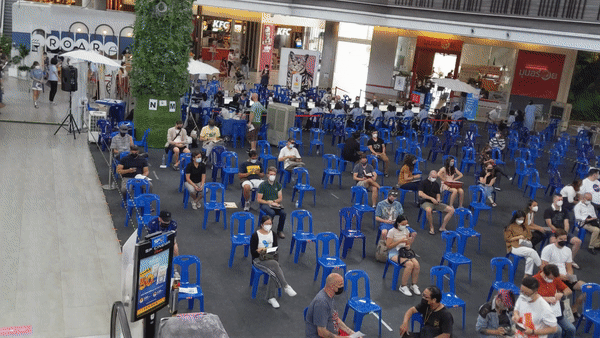
Just before reaching Station 4, the guy behind taps you on the shoulder. He speaks with a French accent.
“Must we go there before this line?” He is pointing to the station with Sign 1.
“Yeah, that’s where they check your heart rate and temperature.” You show him the certificate they gave you from that station.
“Oh no,” he says.
“At least the line moves quickly,” you offer as consolation.
“Thanks,” he says as he leaves his place in line to restart at Station 1.
Good luck, fellow farang. Out there, I am American and you are a Frenchman. Here, we are farang.
At Station 4, they check your documents. Or they register you. You never learn what they’re doing. You choose to ask as few questions as possible, so long as they continue passing you through the process.
At Station 5, the final nurse checks your documents and health certificate, along with some questions about allergies and medication.
She approves, and you move to Station 6. The vaccination station.
The station head directs you to Table 3. As he does, the nurse at Table 3 says in strongly accented English, “Yes yes, here!”
The other nurses laugh. Thai people are as warm as the climate, and have smiles you can see straight through a mask.
You sit. She jabs. You stand. And a page turns. Let’s see what happens in the next chapter. Perhaps a visit home.
